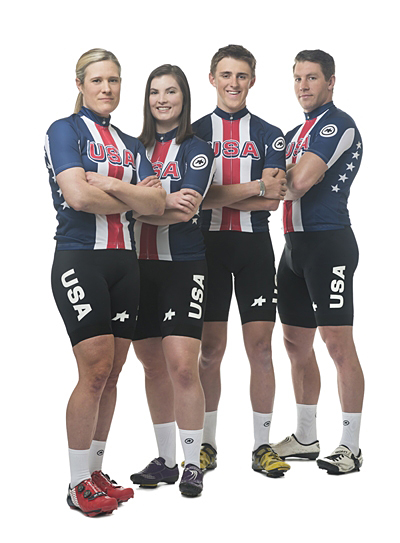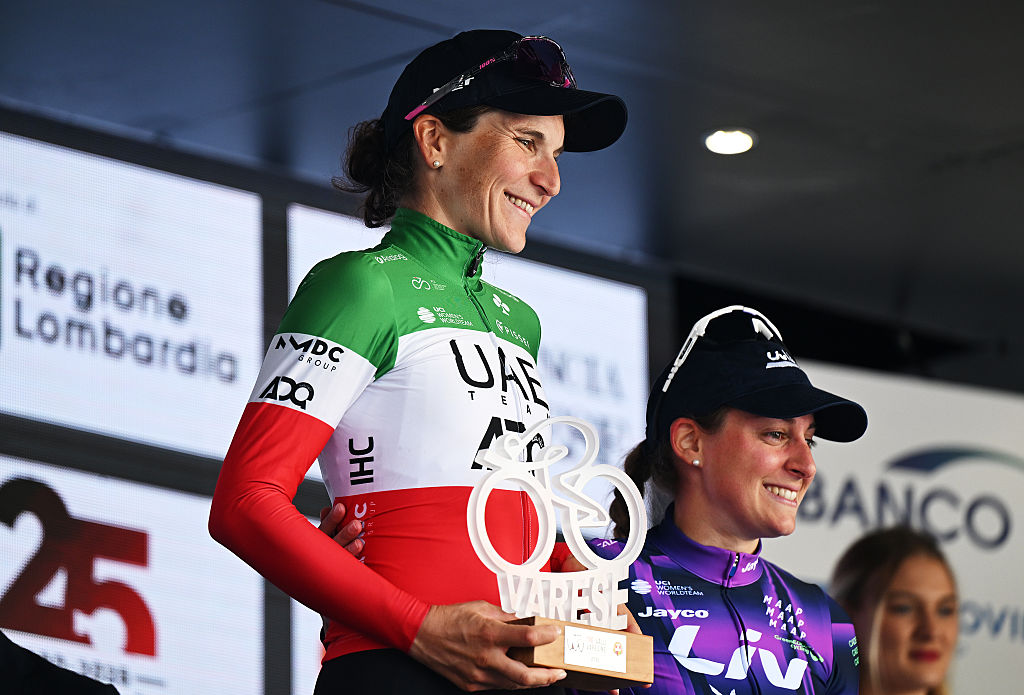US discretionary picks for Elite World Championships saddled with travel expenses
USA Cycling with budget woes after Olympics and expensive Worlds
The latest race content, interviews, features, reviews and expert buying guides, direct to your inbox!
You are now subscribed
Your newsletter sign-up was successful

Budget cuts in an Olympic year have forced USA Cycling to require the discretionary picks for the Elite men's and women's UCI Road World Championships teams to cover the cost of their own travel to Doha, Qatar, next month.
USA Cycling CEO Derek Bouchard Hall told Cyclingnews that cuts to the federation's Elite Athletics budget, combined with the extra expenses of an Olympic year and the high cost of traveling to the Persian Gulf country added up to a perfect storm that forced the move.
"Of course, with all of this our preference would be to fund everybody: 'Here's your tickets, it's all fully paid for. Congratulations repping team USA. Off you go.' But we have limited resources, so hard decisions have to be made. And we do do that in other disciplines, certainly," Bouchard Hall said, while acknowledging it hasn't been the policy for the road World Championships in the past "handful" of years.
The change in policy does not affect automatic selections to the Elite teams or the entire U23 and junior teams, with USA Cycling continuing to pick up the tab for all of the development riders' expenses.
Of the 15 Elite riders who will represent the US at the World Championships in races that take place October 9-16, only five met the criteria for automatic berths: Taylor Phinney in the men's time trial, Megan Guarnier and Coryn Rivera in the women's road race, and Carmen Small in the women's time trial. Alexey Vermeulen, the 21-year-old who rides for LottoNL-Jumbo, qualified for an automatic selection for the U23 time trial but chose to race the Elite time trial instead, so USA Cycling is also covering his travel expenses.
At least one rider Cyclingnews contacted said his trade team is picking up the tab for the trip. Travel expenses could also be paid by trade teams for riders who are competing in the October 9 team time trial. Men's team riders possibly affected by the change in policy include Chad Haga (Giant-Alpecin), Kiel Reijnen (Trek-Segafredo) and Joey Rosskopf (BMC Racing). Robin Carpenter confirmed his Holowesko-Citadel trade team is covering his travel expenses.
Women's team discretionary picks include Allie Dragoo (Twenty16-RideBiker), Amber Neben (Bepink), Alexis Ryan (Canyon-SRAM) and Lauren Stephens (Tibco-Silicon Valley Bank). Coryn Rivera (UnitedHealthcare) and Megan Guarnier (Boels Dolman) earned automatic selections to the women's team.
The latest race content, interviews, features, reviews and expert buying guides, direct to your inbox!
A typical economy-class flight from Chicago O'hare airport to Doha takes at least 13 hours and costs anywhere from $1,100 to $1,600, depending on flight times and connections. Bags and bikes are extra, of course, although Qatar Airways has been waiving fees for competitors.
"...(T)he cost to have a team in Doha for a week is staggering," Miller wrote. "Honestly, Doha is too expensive for national federations to field full teams. As a result, we made the decision earlier this year to deprioritize our emphasis on the Elite at Doha and focus those resources towards the Olympic Games. What that means for you is anyone selected by way of a discretionary nomination will be required to pay their own airfare and excess baggage if you wish to attend. Once you are on the ground in Doha, USA Cycling will assume the associated expenses of the world championships."
Under a "Podium Award" clause, riders in the road race who cover their own travel expenses could be reimbursed if anyone on their respective team earns a medal.
"It's sort of a model we have of incenting team performance and rewarding them if they do it," Bouchard Hall said. "Of course, in the women's race, they have a very good chance of medaling. Coryn and Megan are very well-suited to that course. The men's is obviously more of a long-shot result, which is where we are with the team that we're sending and the course that we have. It's not impossible, of course, but we have much less likely expectation that would happen."
Doubling down on the Olympics and a new ethos toward Elite funding
Bouchard Hall told Cyclingnews that the shift in policy reflects cost-cutting measures as USA Cycling grasps with financial issues and a new ethos that places more emphasis on grass roots cycling. Difficult decisions have to be made as Bouchard Hall moves funding of the Elite Athletics program away from memberships and toward a “self-funding” model that relies on investment from the USA Cycling Foundation, the US Olympic Committee and increased sponsorship.
"We've been actively trying to be very sensible on how much money we're spending on Elite Athletics," he said. "That's being reigned in a bit."
That means an increased focus on high-profile events where there is a high likelihood of success. In Rio, USA Cycling pulled out the stops to support the power-packed women's road race team, Kirstin Armstrong's shot at another time trial gold, the chance of adding to World Championship gold in the women's team pursuit, Sarah Hammer's omnium hopes and the BMX team's podium ambitions.
USA Cycling athletes brought home five medals, including gold for Armstrong and BMX racer Connor fields. Hammer won silver, as did the pursuit team and Alise Post in BMX. Mara Abbott's gutsy ride to fourth in the road race also provided plenty of TV time and headlines for USA Cycling.
"We focused on the Olympics and we pushed really hard to have all the prep for all our teams for the Olympics, and we feel that paid off," Bouchard Hall said. "That was the big prize for us this year – far more important to have a successful Rio than it is for us in the other events like the World Championships or World Cups. Having said that, we want to go there and succeed. We would love to have the women's road champion, and it is absolutely possible with that course, and with Coryn and Megan in particular."
Bouchard Hall admitted, however, that the Olympic effort left the USA Cycling Elite program coffers dry as the end of the season nears.
"In fact, we've got World Cup races to go do on the track side, and we're out of money – we're out of money," he said. "So we're going out with our hat in hand to be able to figure out how we're gong to send our track athletes to the World Cups come this year. I think we will. We'll work with our foundation to step up with things like that. One thing the foundation hates is any athlete losing an opportunity to compete. That's something where they really step up and support us, so they'll probably help us here to get through the year."
It's not a position Bouchard Hall wants to be in, he said, but it isn't unintentional either.
"In the past we've been able to fully fund this, but where we are now, post Olympics, in a year with cut budgets, Jim is struggling," he said.
"We totally get we're asking someone to go represent the United States at the World Championships and then we're asking them to pay to do that," he said. "And Obviously we would not like to do it that way, but when you have limited resources you have to dole them out carefully."
Growing up in Missoula, Montana, Pat competed in his first bike race in 1985 at Flathead Lake. He studied English and journalism at the University of Oregon and has covered North American cycling extensively since 2009, as well as racing and teams in Europe and South America. Pat currently lives in the US outside of Portland, Oregon, with his imaginary dog Rusty.
